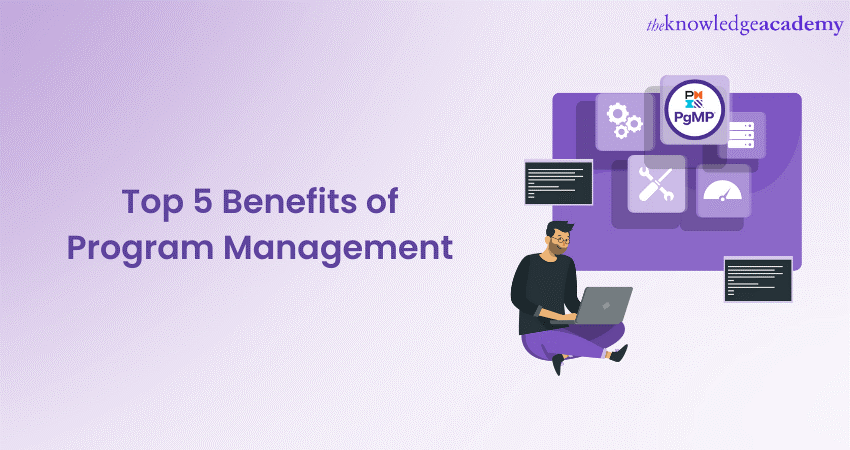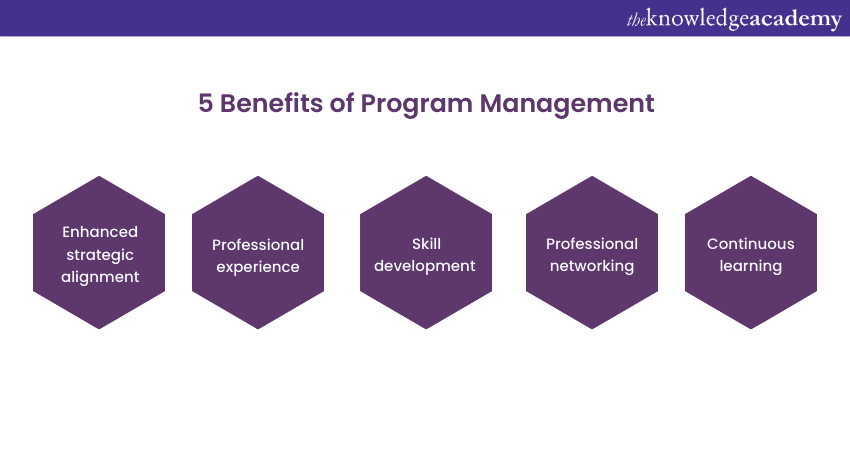We may not have the course you’re looking for. If you enquire or give us a call on +31 208081674 and speak to our training experts, we may still be able to help with your training requirements.
Training Outcomes Within Your Budget!
We ensure quality, budget-alignment, and timely delivery by our expert instructors.

Program Management is a strategic approach that involves coordinating and aligning multiple related projects to achieve a common goal. Unlike Project Management, which focuses on individual projects, Program Management takes a broader view and ensures that projects within a program are strategically aligned with the organisation's objectives. Read this blog to learn about the Benefits of Program Management and how it can help in successfully completing a program.
Table of Contents
1) What is Program Management?
2) What are the Benefits of Program Management?
a) Enhanced strategic alignment
b) Improved resource optimisation and sharing
c) Streamlined communication and collaboration
d) Proactive risk management
e) Reaping the maximum benefits
3) Conclusion
What is Program Management?
Program Management is a strategic approach that involves coordinating multiple related projects and activities to achieve a common goal or objective. It focuses on managing a group of interdependent projects, collectively known as a program, to maximise benefits and optimise resources. Unlike Project Management, which primarily focuses on individual projects, Program Management takes a broader view and aligns various projects to deliver strategic outcomes.
What are the Benefits of Program Management?

Program Management offers many benefits for organisations that adopt this strategic approach. The following are the Program Management benefits:
Enhanced strategic alignment
Program Management ensures that program projects align with the organisation's strategic objectives. It provides a holistic view of the program, enabling Program Managers to identify potential conflicts, dependencies, or synergies among projects. This alignment is essential for organisations to make informed decisions, prioritise initiatives, and allocate resources effectively.
This assessment helps identify projects that contribute most significantly to the overall strategic objectives and ensures that resources are allocated accordingly. By focusing efforts on projects that align closely with strategic goals, organisations can achieve greater results and save resources on initiatives that do not add substantial value.
Program Managers can evaluate the alignment of projects with the evolving business environment and make necessary adjustments to maintain strategic relevance. This adaptability ensures that the program remains responsive to market dynamics, customer needs, and emerging opportunities.
Looking to take your Project Management skills to the next level? Join our PMP® Certification Training Course and unlock new opportunities in your career.
Improved resource optimisation and sharing
Program Management facilitates improved resource optimisation by coordinating and sharing resources across projects within a program. By centralising resource management, organisations can avoid duplication of efforts, minimise waste, and optimise resource utilisation.
Program Managers comprehensively understand resource capacities, skills, and availability across projects, allowing them to identify resource-sharing and collaboration opportunities. They can strategically allocate resources where they are most needed, ensuring that critical projects receive adequate support and attention. This approach prevents resource bottlenecks, reduces idle time, and maximises organisational capabilities.
Improved resource optimisation also leads to cost savings. Organisations can reduce unnecessary expenses associated with redundant resources or underutilisation by effectively utilising shared resources. This efficient allocation of resources enables organisations to achieve more with the same or even fewer resources, enhancing overall cost-effectiveness and financial performance.
Learn the principles of project management and Program Management with our extensive PMP Training courses.
Streamlined communication and collaboration
Program Management emphasises the importance of effective communication and collaboration among stakeholders involved in a program. Clear and consistent communication channels ensure that information flows seamlessly across projects, teams, and organisational levels. This streamlined communication fosters a collaborative environment that enhances productivity and reduces risks associated with miscommunication.
By streamlining communication, Program Management helps to avoid misunderstandings, reduce conflicts, and align expectations. It enables stakeholders to understand project dependencies, milestones, and deliverables clearly, facilitating effective decision-making and timely action. It also promotes transparency and accountability, as stakeholders have access to relevant information and can promptly provide feedback or raise concerns.
Proactive risk management
Program Management incorporates proactive risk management practices, identifying and addressing potential risks at project and program levels. Program Managers conduct comprehensive risk assessments, develop mitigation strategies, and monitor the risk landscape continuously. This proactive approach helps organisations minimise the impact of risks, avoid costly delays, and ensure smooth progress throughout the Program Lifecycle Management process.
Reaping the maximum benefits and choosing the best projects
One of the primary objectives of Program Management is to maximise benefits and ensure the successful delivery of program outcomes. Program Managers focus on creating value, measuring benefits, and implementing strategies to enhance benefits realisation.
Organisations can optimise program outcomes and achieve the desired business results by consistently monitoring progress, evaluating performance, and making necessary adjustments. With Program Management, you can choose the best projects that align with your strategic objectives, ensuring focused efforts on initiatives that deliver the most value. By carefully selecting projects within a program, you optimise resource allocation and maximise the chances of achieving successful outcomes.
Ready to kickstart your journey in project management? Join our CAPM® Certification Training Course and gain the essential knowledge and skills to excel in this dynamic field.
Conclusion
The Benefits of Program Management are invaluable for organisations striving to achieve their strategic objectives. By embracing Program Management practices, organisations can align projects with strategic goals, optimise resource utilisation, streamline communication and collaboration, proactively manage risks, and enhance benefits realisation. Embracing Program Management is a strategic investment that empowers organisations to excel in their projects and drive long-term success.
Learn the fundamentals of project management before you jump into program management with PMI Project Management Ready training.
Frequently Asked Questions
Upcoming Project Management Resources Batches & Dates
Date
 PMP® Certification Training Course
PMP® Certification Training Course
Mon 6th Jan 2025
Mon 13th Jan 2025
Mon 20th Jan 2025
Mon 27th Jan 2025
Mon 3rd Feb 2025
Mon 10th Feb 2025
Mon 17th Feb 2025
Mon 24th Feb 2025
Mon 3rd Mar 2025
Mon 10th Mar 2025
Mon 17th Mar 2025
Mon 24th Mar 2025
Mon 31st Mar 2025
Mon 7th Apr 2025
Mon 14th Apr 2025
Tue 22nd Apr 2025
Mon 28th Apr 2025
Tue 6th May 2025
Mon 12th May 2025
Mon 19th May 2025
Tue 27th May 2025
Mon 2nd Jun 2025
Mon 9th Jun 2025
Mon 16th Jun 2025
Mon 23rd Jun 2025
Mon 30th Jun 2025
Mon 7th Jul 2025
Mon 14th Jul 2025
Mon 21st Jul 2025
Mon 28th Jul 2025
Mon 4th Aug 2025
Mon 11th Aug 2025
Mon 18th Aug 2025
Tue 26th Aug 2025
Mon 1st Sep 2025
Mon 8th Sep 2025
Mon 15th Sep 2025
Mon 22nd Sep 2025
Mon 29th Sep 2025
Mon 6th Oct 2025
Mon 13th Oct 2025
Mon 20th Oct 2025
Mon 27th Oct 2025
Mon 3rd Nov 2025
Mon 10th Nov 2025
Mon 17th Nov 2025
Mon 24th Nov 2025
Mon 1st Dec 2025
Mon 8th Dec 2025
Mon 15th Dec 2025







 Top Rated Course
Top Rated Course



 If you wish to make any changes to your course, please
If you wish to make any changes to your course, please


